COAST Card project launched

Coastal Ocean Assessment for Sustainability and Transformation (or COAST Card) launched virtually and continues to move forward. This project is funded under the Belmont Forum Ocean Sustainability Collaborative Research Action (CRA).
COAST Card international partnership continues to grow
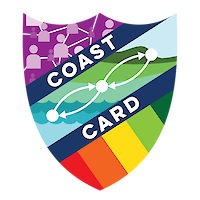
The Coastal Ocean Assessment for Sustainability and Transformation (COAST) Card is an international, transdisciplinary research program seeking to foster solutions to global sustainability challenges. This project brings together researchers from the USA, Japan, Philippines, Norway, and India. COAST Card merges three tools: socio-ecological network analyses; socio-environmental report cards; and system dynamics models. Email coastcard.research@gmail.com to subscribe to the newsletter, and follow COAST card on Twitter, Instagram, and LinkedIn.
COAST Card Research Consortium releases first newsletter
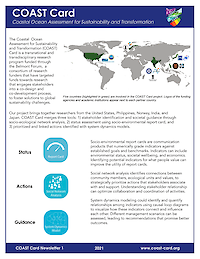
The Coastal Ocean Assessment for Sustainability and Transformation (COAST) Card is an international, transdisciplinary research program seeking to foster solutions to global sustainability challenges. This project brings together researchers from the USA, Japan, Philippines, Norway, and India. COAST Card merges three tools: socio-ecological network analyses; socio-environmental report cards; and system dynamics models. You can subscribe to the COAST Card e-news for updates. Follow COAST card on Twitter, Instagram, and LinkedIn.
Kicking off the COAST Card project

IAN-UMCES led the kick-off activities of our Belmont Forum-funded project, COAST Card (Coastal Ocean Assessment for Sustainability and Transformation), through a series of virtual meetings in September and October. The meetings brought together partners from the USA, Norway, Japan, Philippines, and India. COAST Card integrates socio-environmental report cards, social network analysis, and system dynamics modeling in global locations: the Chesapeake Bay (USA), Manila Bay (Philippines), Tokyo Bay and Ishigaki Island (Japan), and the Goa Coast of India. To learn more, please visit the project site.
Subscribe to the COAST Card Research Consortium newsletter
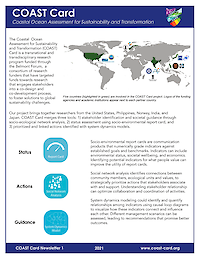
The Coastal Ocean Assessment for Sustainability and Transformation (COAST) Card is an international, transdisciplinary research program seeking to foster solutions to global sustainability challenges. This project brings together researchers from the USA, Japan, Philippines, Norway, and India. COAST Card merges three tools: socio-ecological network analyses; socio-environmental report cards; and system dynamics models. You can subscribe to the COAST Card e-news for updates. Follow COAST card on Twitter, Instagram, and LinkedIn.
Subscribe to the COAST Card Research Consortium newsletter

The Coastal Ocean Assessment for Sustainability and Transformation (COAST) Card is an international, transdisciplinary research program seeking to foster solutions to global sustainability challenges. This project brings together researchers from the USA, Japan, Philippines, Norway, and India. COAST Card merges three tools: socio-ecological network analyses; socio-environmental report cards; and system dynamics models. You can subscribe to the COAST Card e-news for updates. Follow COAST card on Twitter, Instagram, and LinkedIn.
COAST Card at the 24th International RiverSymposium
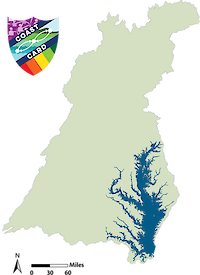
Our COAST Card team virtually presented at the 24th International RiverSymposium, on topics including how report cards help inform environmental management, stakeholder engagement and environmental justice, and how to build better relationships with international teams. Strategies like these help advance the effort of moving from healthy rivers to resilient rivers. In addition to presentations by our international team, Dr. Bill Dennison and Dr. Vanessa Vargas-Nguyen facilitated a workshop with the James River Association to share success stories of using report cards to catalyze meaningful action. To learn more about the conference, visit riverysymposium.com.
COAST Card: Coastal and Marine Spatial Planning Workshop
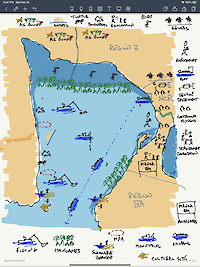
Dr. Bill Dennison, Dr. Vanessa Vargas-Nguyen, and Kelly Dobroski participated in a five-day session on Coastal and Marine Spatial Planning hosted by the Philippines Department of Environment and Natural Resources (DENR) on November 7–11, 2021. COAST Card partners from the US and Philippines delivered lectures on ecosystem-based management, Manila Bay natural resources, and stakeholder engagement practices. After two days of presentations, IAN staff facilitated a three-day Coastal and Marine Spatial Planning Workshop. This workshop revealed the values and threats to Manila Bay, additional stakeholders to engage, and a shared vision. Four key areas of coastal planning were addressed: data availability, user compatibility, stakeholder engagement, and evaluation. Equipped with these tools, the Philippines DENR will host similar workshops to continue engaging additional stakeholders as they work to develop a spatial plan for Manila Bay. Interested in viewing the first two days of presentations? Watch the Day 1 session here, and Day 2 session here.
Global Sustainability Scholars Arrive

From May to June, we will be joined by four Global Sustainability Scholars and Fellows: Lawren Caldwell, Anna Calderon, Nick An, and Pheng Lor. Global Sustainability Scholars are undergraduate and graduate students from diverse backgrounds researching sustainability challenges facing communities and environments. In collaboration with COAST Card, these students will work to enhance stakeholder engagement and evaluation and work to generate the Potomac COAST Card.
The Potomac River workshop was a success
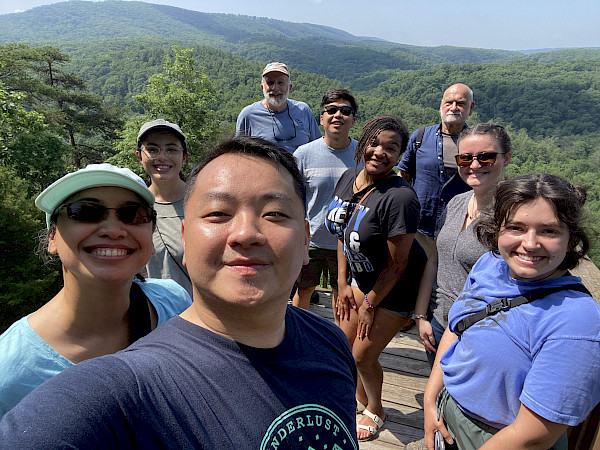
The COAST Card project made great progress in June with a small workshop held at Hood College in Frederick, MD. The project will focus on assessing the Potomac River Watershed through the lens of the COAST Card framework, which combines environmental report cards, social network analysis, and system dynamics modeling. The trip also consisted of meetings with scientists at the Appalachian Laboratory and field visits across different areas of the Potomac River Watershed. In hopes of engaging more stakeholders, there will be an open house workshop on July 21st from 12–8 pm at the Whitaker Community Commons building at Hood College. If you are interested in attending, you can register here.
The Potomac Open House was a success
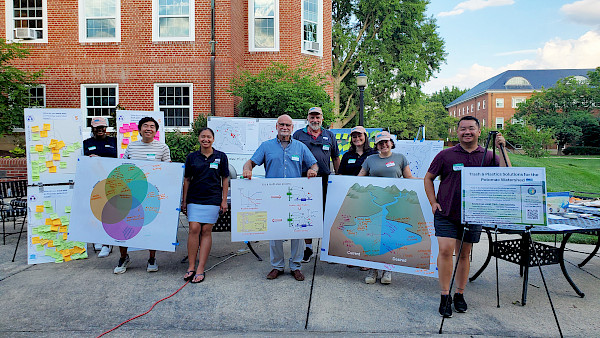
The COAST Card team held their first open house event for the Potomac River Watershed on July 21st at Hood College in Frederick, MD. Over 40 stakeholders dropped in throughout the day to engage with the key features of the COAST Card project. Stakeholders identified recreation as their top value of the watershed and populated maps of the Potomac Watershed and Frederick County with stickers indicating all the places they “play.” Participants also identified important indicators and potential future stakeholders they would like to work with. Additionally, stakeholders thought about cause and effect relationships within the watershed and built their vision of a sustainable Potomac.
Farewell, Global Sustainability Scholars!
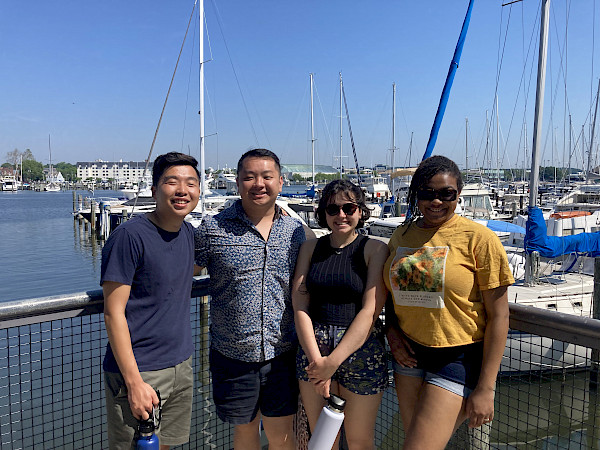
Our four Global Sustainability Scholars (GSS) completed their summer program at UMCES IAN at July end. During their time with us, they had the opportunity to travel throughout Maryland and helped with the COAST Card project in an impactful way. They played a large part in the Potomac Open House and completed their respective projects in specific sustainability topics. It has been such a pleasure to work with these bright individuals and we are grateful for all that they have done. We hope they go on to do amazing things.
COAST Card Annual Meeting
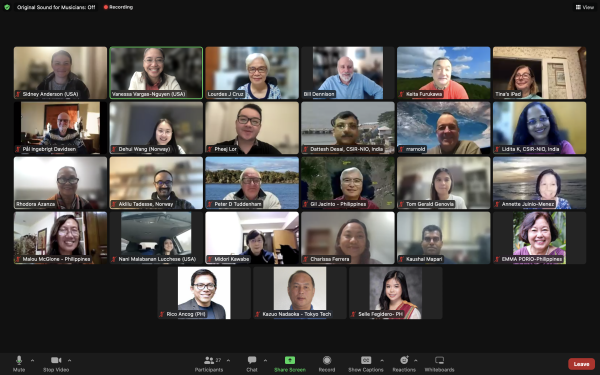
On December 6th, the COAST Card Project held their third annual meeting. This virtual meeting brought together over 25 scientists from the United States, Norway, Japan, India, and the Philippines to discuss the project’s accomplishments over the last year and to set goals for 2023. Partners across the globe engaged in stakeholder engagement, marine spatial planning sessions, and hosted listening sessions in their communities. In the coming year, partners will continue to engage with the public and publish peer-reviewed papers, as well as begin in-person site visits to international study sites. Follow the link below to see the discussion board from the meeting and watch video updates on all the COAST Card project has accomplished throughout 2022.
COAST Card Stakeholder Listening Sessions
This year, the COAST Card project launched a series of stakeholder listening sessions in the D.C.-Maryland region to engage with local opinions on river condition and management. Listening sessions were held for three rivers:
- Patuxent River in Maryland
- Potomac River in Maryland/Virginia/D.C.
- Choptank River in Maryland
First COAST Card workshop in Manila, Philippines
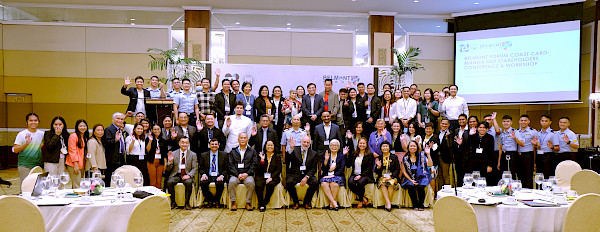
From February 26th to March 6th, members of the COAST Card team travelled to Manila Bay in the Philippines for the first in-person meeting of the project. This meeting brought together local stakeholders and scientists, as well as representatives from the project’s 4 international partners—Japan, India, Norway, and the United States. Over the course of the trip, project members gave talks, facilitated workshops, and engaged with the local community to begin development of the Manila Bay and Watershed Report Card. Field trips around the bay allowed project partners to experience this important area in the Philippines and see the characteristics of the bay that the team has been discussing virtually for the last two years. The team will be traveling to Tokyo Bay in November to continue its international site visits.
Welcome, Global Sustainability Scholars!
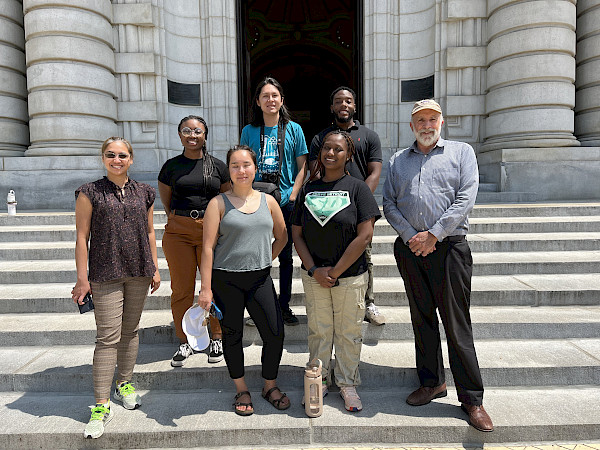
We are thrilled to welcome another remarkable group of Global Sustainability Scholars this summer from May 26-July 21. Please give a warm welcome to Anna Calderón (returning scholar, Wellesley College), Taylor Mitchell (University of Michigan), Kameryn Overton (Tuskegee University), Emma Gee (UC Santa Cruz), Darion Fredericks (Fort Lewis College), and Tre’Nard Morgan (University of Michigan). Comprised of diverse backgrounds and expertise, these scholars are passionate about environmental justice challenges, and with their understanding of sustainable practices, they bring a wealth of knowledge to our team. During their time, they will collaborate on the Coastal Ocean Assessment for Sustainability and Transformation Project (COAST Card) to develop a stakeholder engagement toolbox and the Potomac River Report Card utilizing listening sessions throughout the Potomac Watershed. The collective wisdom and enthusiasm of these scholars promises an exciting and impactful summer ahead.
Advancing the New Potomac Report Card through Listening Sessions
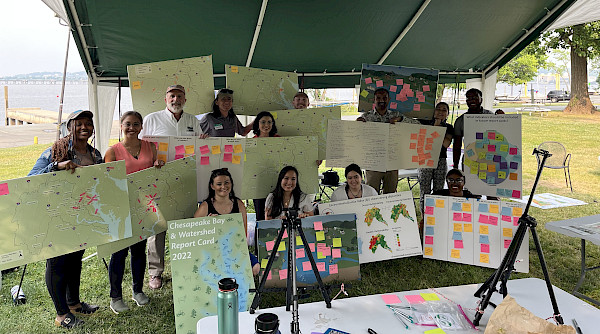
The 2022 Potomac River and Watershed Report Card was released on June 6th and incorporated data from the 2022 Chesapeake Bay and Watershed Report Card. The Potomac River and its watershed are a focus of the Coastal Ocean Assessment for Sustainability and Transformation Project (COAST Card), and the report card will be further developed through stakeholder input received at listening sessions throughout the Potomac watershed.
The COAST Card team has held two stakeholder listening sessions so far during June, with two more happening before the end of the month. The first session occurred on June 6th at the Washington Sailing Marina, right after the 2022 Chesapeake Bay Report Card release, and the second one occurred on June 8th at the Leonardtown Wharf Park. We had a great turnout of participants at both events and were able to showcase the new Potomac River Report Card. The next two will be on June 14th at the Potomac Science Center (Woodbridge, VA) and on June 22nd at Canal Place Heritage Park (Cumberland, MD).
These listening sessions are aimed at bringing together diverse community stakeholders in the Potomac Watershed. Engaging with individuals representing various backgrounds, perspectives, and interests allows for a comprehensive understanding of the challenges and aspirations of the watershed's communities. This collaborative approach fosters a sense of ownership, promotes environmental justice, and ensures that the voices of marginalized groups are heard and considered in the decision-making processes. The ultimate goal of these listening sessions is to help inform the next iteration of the Potomac River and Watershed Report Card.
Gaining Valuable Perspectives of the Potomac River and Watershed
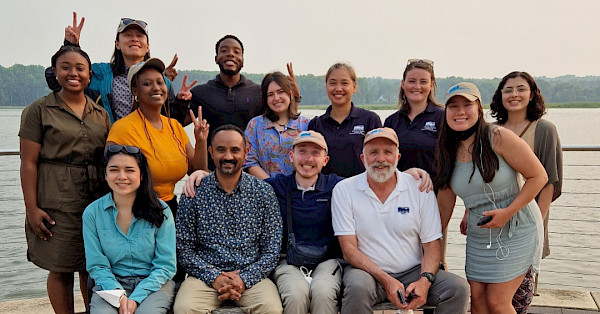
The Coastal Ocean Assessment for Sustainability and Transformation project (COAST Card) had a productive June month that entailed traveling to various areas of the Potomac Watershed and conducting four different listening sessions. The listening sessions were held in:
- Alexandria, VA at the Washington Sailing Marina
- Leonardtown, MD at the Leonardtown Wharf
- Woodbridge, VA at the Potomac Science Center
- Cumberland, MD at the Canal Place Heritage Park
Over 100 participants took the time to share their perspectives about the Potomac, including their values and threats to the Potomac and their vision for a sustainable Potomac. The responses will help inform the best indicators to use for assessing the ecosystem health in the area, with the goal of creating a more comprehensive Potomac River and Watershed report card.
Sustainability Research and Innovation Congress in Panama
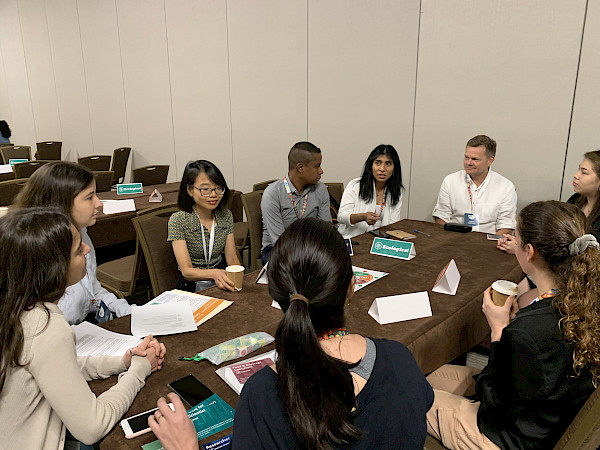
In the last week of June 2023, Alexandra Fries, Vanessa Vargas-Nguyen, and Bill Dennison attended the 2023 Sustainability Research and Innovation Congress in Panama City, Panama. They presented on several UMCES projects including the Belmont Forum-funded Pacific Ocean Pathways in Support of Sustainable Development (PacPathways) and Coastal Ocean Assessment for Sustainability and Transformation (COAST Card) projects. IAN supported Xin Zhang and Kevin Jackson from Appalachian Lab in playing the Sustainable Agriculture Matrix (SAM) version of the report card game, Get the Grade. IAN also hosted an additional Get the Grade session and a Science Communication Workshop. The Congress was a huge success and it was great to be in-person making connections with old partners and new collaborators.
Another successful summer with the GSS Scholars
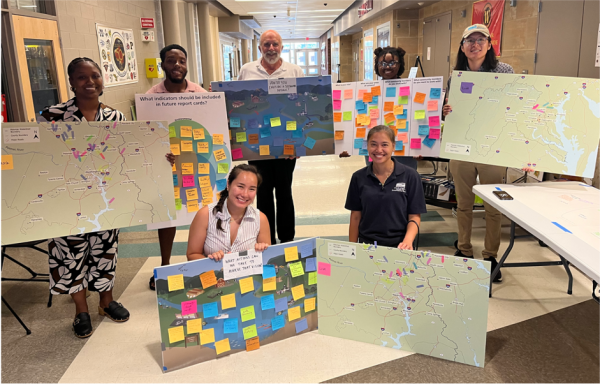
Our second cohort of Global Sustainability Scholars and Fellows (GSS) concluded their program on July 21st. They presented their findings from the Potomac Listening Sessions and gave valuable insights that will help us improve our outreach and engagement. We really appreciate their contributions and wish them the best of luck with their future endeavors.
COAST Card team's Tokyo experience: Amamo2023 and J-COAST Conference insights

From November 17–22, the COAST Card team met in Tokyo, Japan for the Amamo2023 and J-COAST conference and meeting hosted at the Sasikawa Peace Foundation. While there, team members listened to and presented talks on seagrass, blue carbon, youth engagement, science communication, and the COAST Card Project. The conference highlighted the importance of empowering and engaging youth in restoration efforts. They visited various places around Tokyo that are of interest to the COAST Card Project or serve as sites of engagement and restoration events.
Learning about reef recovery and conservation practices in Ishigaki Island
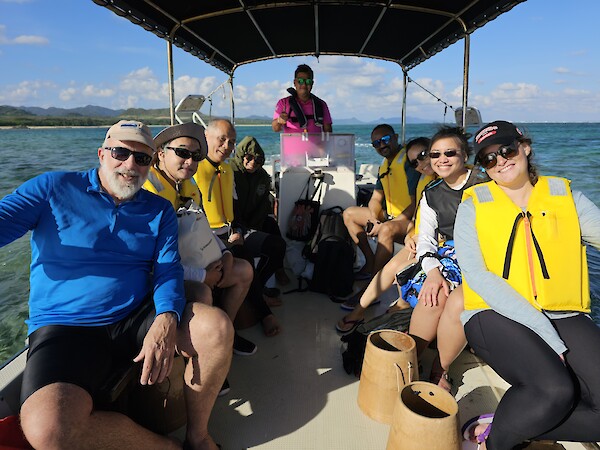
From November 22–24, the COAST Card partners visited the second Japanese study site, Ishigaki Island and Sekisei Lagoon. There, they visited multiple reef sites in different stages of recovery from bleaching events and saw the mitigation practices implemented by farmers to reduce agricultural runoff. They also met with different stakeholders from different sectors that are active in the protection and conservation of Ishigaki Island.
COAST Card Project Highlights
The Coastal Ocean Assessment for Sustainability and Transformation (COAST Card) project had an eventful year consisting of both local and international travel.
- Conference and workshop in Manila, Philippines
- Conference and workshop in Tokyo, Japan; site visits to Ishigaki Island and Sekisei Lagoon, Japan
- Stakeholder listening sessions in the Potomac Watershed, USA:
- Alexandria, VA
- Leonardtown, MD
- Woodbridge, VA
- Cumberland, MD
- Silver Spring, MD
The international conferences and workshops allowed project partners to meet in person, make progress on goals, and gain a deeper understanding of the different study sites. The five stakeholder listening sessions held across the Potomac Watershed in the summer, facilitated by our second cohort of Global Sustainability Scholars, provided important insights on values, threats, and visions related to the watershed.
COAST Card goes to India
The COAST Card project is gearing up for its third international meeting, set to take place in Goa, India, from February 5th to 8th. This collaborative project brings together experts from the United States, the Philippines, India, Japan, and Norway. Following the successful hosting of project partners by the Philippines and Japan last year, this meeting promises to provide another invaluable opportunity for participants to connect with project collaborators, visit key study sites, and advance toward achieving the project's goals.
COAST Card visits Goa, India for third meeting
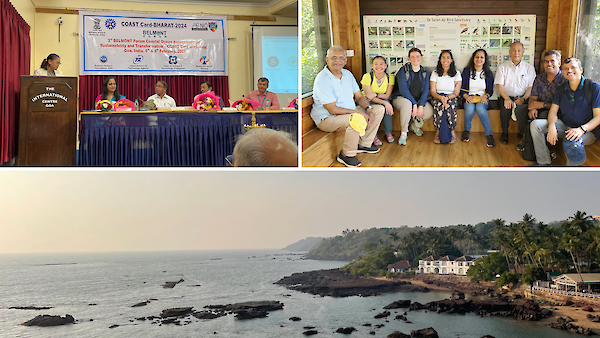
From February 4th to 10th, the COAST Card team visited Goa, India for their third study site visit. While there, they participated in the Bharat-COAST Meeting, presenting on the Chesapeake Bay Coast Card, moderating sessions, judging a poster session, and helping to facilitate a Listening Session. The meeting brought together scientists, doctors, community leaders, and students of all ages to discuss the sustainability of the Goa coast and the social and ecological threats it faces. Following the meeting, the team visited mangrove forests, historic churches, a spice farm, the National Institute of Oceanography, and a local eco-farm. These field trips gave the team members first-hand experience with the study site and provided ample inspiration for the last year of the COAST Card Project.
Engaging with the agricultural community in Fredericksburg
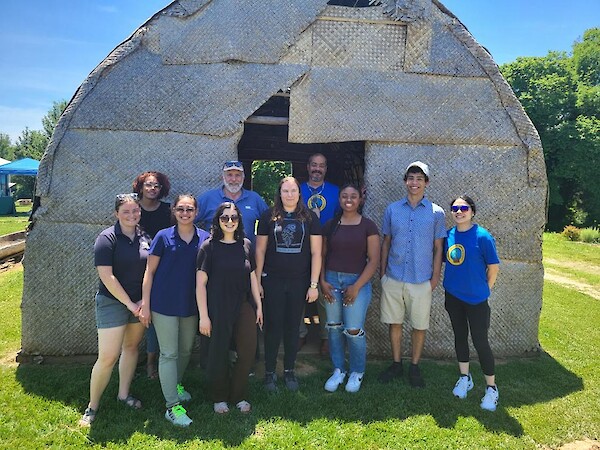
On June 1st, the COAST Card team and Global Sustainability Scholars attended the 2024 Community Ag Outreach event in Fredericksburg, VA. The event was hosted by the Tri-County/City Soil and Water Conservation District and Patawomeck Indian Tribe. Our table was interactive, following a listening session format which allowed attendees to identify watershed values, threats, visions, and actions, and to share their experiences with agriculture. This was an opportunity to engage with farmers, landowners, and local public and private organizations involved in conservation. The site also featured the Patawomeck Museum and Cultural Center, an outdoor Living History Village, and gardens.
Highlights from the 2024 Chesapeake Community Research Symposium

From June 10-12th, the 2024 Chesapeake Community Research Symposium was held in Annapolis, MD, and attended by Sidney Anderson, Veronica Malabanan-Lucchese, Lili Badri, and our summer Global Sustainability Scholars. The conference featured Chesapeake scientists, managers, and stakeholders who provided updates on Chesapeake Bay restoration and resilience progress through plenary talks, panel discussions, and special sessions. Our team presented on the final day during the session "Co-designing Solutions to Support Community Resilience in the Chesapeake Bay Watershed." The talks highlighted various aspects of the COAST Card project, including results from our previous listening sessions and social network analysis.
Highlights from the SRI Conference in Helsinki, Finland

Alexandra Fries, Heath Kelsey, Vanessa Vargas-Nguyen, and Bill Dennison attended Sustainability Research and Innovation Congress in Helsinki, Finland from June 10-14th. They facilitated several workshops on science communication and stakeholder engagement. They also collaborated with partners from University of South Carolina, University of Bergen, and Future Earth Coasts. The conference was a great venue to advance IAN’s thinking on sustainability and working to solve global challenges. Also, the synthesis and communication that IAN products accomplish was mentioned as an asset that is greatly needed to impact policy-making and improve natural resource management.
Engaging communities in the Middle Branch
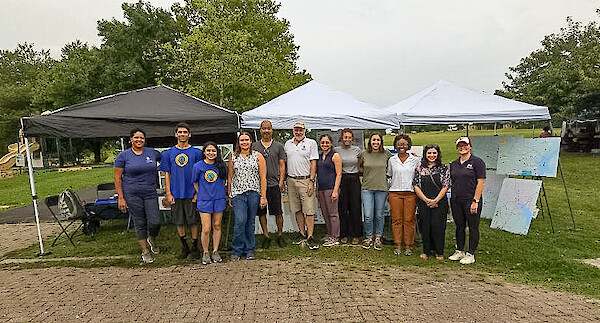
On July 20th, we held a stakeholder listening session at Middle Branch Park in Baltimore, MD. This event was in collaboration with the Environmental Justice Journalism Initiative (EJJI) and their Reel Rewards Program, which rewards anglers $30 for each head or body of an invasive fish species caught in the Middle Branch. It was a great opportunity to speak with anglers and for members of the public who enjoy the park to share their opinions on the current conditions of the Baltimore Harbor and Patapsco River.
Thank you and farewell to our 2024 Global Sustainability Scholars!
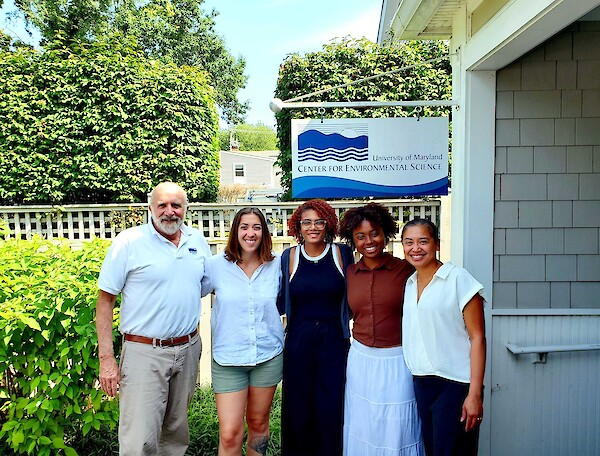
This summer, three Global Sustainability Scholars joined the COAST Card project: Kameryn Overton, Taylor Ouellette, and Bailee Porter. Kameryn worked closely with Veronica Lucchese and the Environmental Justice Journalism Initiative in their Reel Rewards Program and helped coordinate the Middle Branch Listening Session. Bailee conducted research to identify barriers to effective policy implementation, which will inform governance-related indicators for report cards in the Chesapeake Bay Watershed and the other COAST Card study sites. Taylor created a fantastic story map that describes and synthesizes the listening sessions conducted by IAN and facilitated with the GSS cohorts from 2022-2024. We are deeply grateful for their contributions and wish them all the best in their future endeavors!
COAST Card USA Hosts Chesapeake Meeting
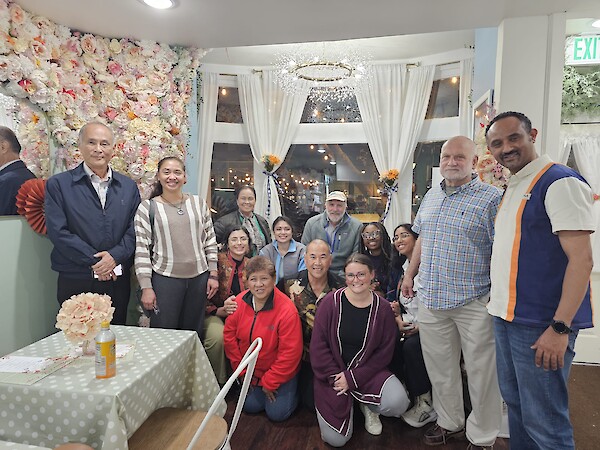
From October 7-11, the COAST Card Chesapeake team hosted their international collaborators for the last field site visit of the COAST Card project. While here, they visited Poplar Island, an island off the coast of Maryland being reconstructed using dredge material, toured the HPL Oyster Hatchery, and took a boat tour of Baltimore Harbor, on which the captain took the boat a little farther to get a view of the Key Bridge. They also held their 5th Annual Meeting, which focused on wrapping up the COAST Card project and future proposals, and participated in the day-long Baltimore Harbor Summit at the Institute for Marine and Environmental Technology.
Sharing Lessons to Advance Multidisciplinary Collaborations
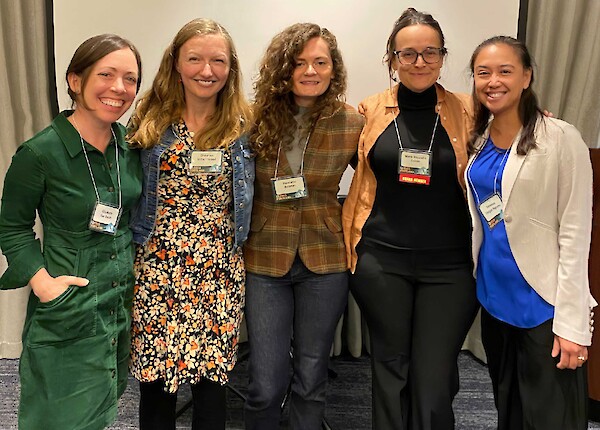
Vanessa Vargas-Nguyen participated in a panel at the 85th Annual Meeting of the Society for Applied Anthropology (SfAA) held in Portland, Oregon from March 25–29th. The session, Building and Sustaining Multidisciplinary Environmental Partnerships, brought together experts from government, academia, and NGOs to share strategies for advancing inclusive cross-sector collaborations that can address today’s most pressing environmental challenges. Vanessa shared insights from her work on transdisciplinary and transnational approaches to coastal sustainability, highlighting lessons from the COAST card project and emphasizing the importance of integrating local knowledge into environmental governance.

